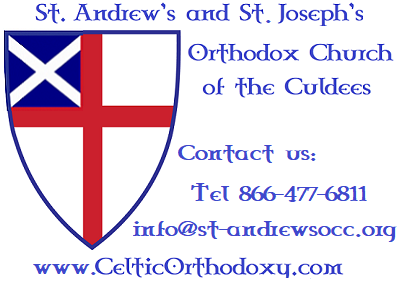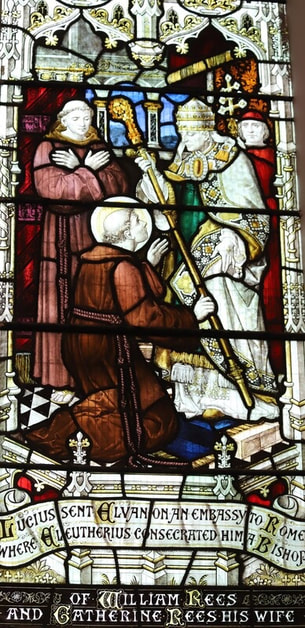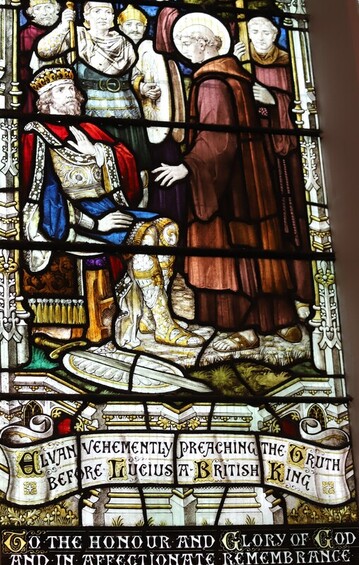Sermon broadcasted January 1st, 2024: https://youtube.com/live/5UaT3L_K7hg
Here is another great lesson regarding the early Celtic Saints (we document over 1,000 more Saints which are officially honored by the Orthodox, as Saints who had flourished in their ministries before Augustine came to Britain). Enjoy today’s commemoration of the Classic Welsh Saint Elfan this January 1st and September 26th, or whenever you wish to thank and praise YAHWEH for what He has done for us through His vessels of glory, His saints:
Ephesians 1:18 “The eyes of your understanding being enlightened; that ye may know what is the hope of His calling, and what the riches of the glory of His inheritance in the saints,”.
Listen to this audio message by Pastor Crouch on “His Inheritance in the Saints”.
Read about why it’s good to decorate churches with depictions of Saints: https://celticorthodoxy.com/2018/10/biblical-artwork-is-commanded-by-god-for-churches/
From the 1st – 5th Centuries Britain had remained a Roman province. This is why most of our oldest Celtic Liturgy was in the Latin language. As from the book “History of the Ancient Britons till the Saxon Invasion“, the history is mostly about the Roman government of Britain. Even Brutus, the earlier founder of Britain, was of the Trojan Greco-Roman fame, as were his kindred Spartans. Their line is greatly documented as being of the true line of Judah and Ephraim, which the Scripture called the grandchildren of Dardanus who were almost as wise as Solomon (1Kings 4:31). Join our British Israel Book club to get hundreds of free books on this great topic of the Celto-Saxon and Kindred peoples being the True Israel of God. The online and local meetup memberships are for those genuinely interested in our heritage. All e-books are free of charge. We’re looking for volunteers to help us build up www.BritishIsraelism.com!
Rome’s glory was only because of God’s covenant to keep the true Judah lines on the thrones governing His people (even though Israel mostly had wicked Kings, He keeps covenant). It’s important to know what it means for His coming Kingdom restoration on earth, as it was done in “His Kingdom” in the times of righteous Kings. He gave us many cities to “occupy till He comes“.
St Elfan Avalonius, 2nd Century Welsh Saint, comm. January 1st and Sept 26
Cressy lists Elvanus as 10th British Bishop, while we at OCC list him as the 40th. It is even higher when we combine the French, Scottish and Irish expanded version of early Celtic Saints (As of 2023, we aim for publishing in mid 2024, as time and resources are available) who also used the name British. Dozens of these 1st and 2nd Century British Saints are commemorated throughout the Orthodox world many times per year.
In this article we quote from several histories that are often dismissive of the notion that there was such intercourse with Rome, which may be mis-used by the uneducated to doubt some of their existence altogether. This great light of evidence shows He was much stronger in the work of His saints than the wilfully ignorant have thought. However may we praise God for this proof of His foundations of His covenants towards His covenant people “British Israel” that remain for ever.
An entry in the Book of Llandaff reads:
“King Lucius sent Elvanus and Medwinus to Eleutherius (12th Pope) asserting that King Lucius might be made a Christian”.
The ambassadors were first baptised and then instructed in the Christian faith. Elvanus was made a Bishop and Medwinus a teacher. Being now qualified they returned to King Lucius and baptised the King in accordance with Pope Eleutherius instruction.
The version of the Lucius story is that we now see in the “Elvan Window” in the north transept of the church albeit omitting any reference to Medwinus. In the 12th century Geoffrey of Monmouth embroiders the story and causes some confusion, claiming the Pope gave the ambassadors, as companions, blessed priests Faganus and Deruvianus
Through the preaching of these early Christian missionaries, it is claimed the chief men of all Britain received baptism, and “according to the command of the blessed Pope Eleutherius, established ecclesiastical order”.
St Elvan Preached The Christian Faith
It is thought that the foundations for the Welsh Church was laid in late Roman Britain and we may assume that Saint Elvan was one of the early apostles of the Christian movement that captivated Wales entirely.
He and his fellow missionaries won over not only the people of their day but ensured that Wales would continue steadfast in the faith through the labourers of their Celtic successors in the ‘Age of Saints’ in the 5th century.
Four churches in the Llandaff Diocese bore the names relating to this story Lleurwg (Lucius), Dyfan, Ffagan, and Medwy, which adds to the belief in the existence of these old Celtic Saints and indicates the scene of their labours.
In the now lost ‘Book of British Bishops’ by the monk Jocelyn of Furness in 1187, Elvanus was recorded as the second Bishop of London and built a library at St Peter upon Cornhill church. It also records that Elvanus converted many of the Druids to the Christian faith.
From “History of the Ancient Britons till the Saxon Invasion“:
King Lucius (2nd Century King of Britain) dispatched two British Christians, Medwy and Elvan, or Elfan, to Eleutherius, Bishop of Rome; not because he regarded that Bishop as the supreme head of the Christian community, but simply because he himself, being tributary to the Romans, naturally looked up to Rome as the centre of information upon every question of importance; that Eleutherius, in compliance with the request of Lucius, sent back, with Elvan and Medwy, two ecclesiastics, to whom tradition has assigned the names Of Faganus and Duvianus; who, coming in to Britain, baptized king Lucius and many of his subjects, and thus enlarged and more fully confirmed that Christian faith, which had been introduced into different parts of the island for upwards of 100 years (37AD St Joseph of Arimathea). ” But all which took place at this time falls far short of an universal establishment of the Christian religion in Britain. King Lucius and the principal part of the inhabitants of the south, may have conformed to Christian practices in token of their recognition of the Christian faith, but more than a century after this date we find paganism still in existence, over a very large portion of our island.”
Another logical account of his life is from “Lives of the British Saints“, by Baring-Gould and Fisher 1908:
S. ELFAN, Bishop, Confessor ELFAN figures in the Lucius legend. Welsh hagiology gives two slightly varying accounts of him. One account makes him a Roman . An application was made by King Lleurwg or Lucius to Pope Eleutherius for instruction in the Christian Faith, and Eleutherius sent him four persons, Dyfan, Ffagan, Medwy and Elfan to instruct him. 3 According to the other account he was a Briton. The Book of Llan Dâv, 8 compiled in the twelfth century, states that in the year 156, Lucius, king of the Britons, sent his ambassadors, Elvanus and Medwinus, to Pope Eleutherius. “ They implore that, by the Pope’s admonition, he might be made a Christian.” Eleutherius accordingly baptized the legates, and ordained Elvanus a bishop, and Medwinus a doctor. Through their preaching Lucius himself and the nobles of all Britain received baptism. It is further stated 5 that he ” was a bishop in Glastonbury, where his church and côr are.” Côr Elfan accommodated a thousand Saints. He is also said to have had a church in Glamorgan. There is a modern church ( 1854) in the parish of Aberdare dedicated to him. “ Côr Elfan ” is the name of an old Welsh air.
According to Bale he was surnamed Avalonius, and Joscelyn of Furness says that he succeeded Theanus, and thus became the second bishop of London. His festival does not occur in the Welsh Calendars, but it is given as September 26.
Alternative date: Rees, Welsh Saints, p. 86. Owen, in his Sanctorale Catholicum , gives Medwyn and Elfan on January 1, and adds, “ Elfan is said to have been a native of Avalon, now Glastonbury .”
In “An Essay on the Welsh Saints or the Primitive Christians“, by Dees
This volume assesses the evidence proving the historicity of this Saint. The author cites not only the common histories but also Bishop Ussher, who quoted above fifty Latin authorities with a view to ascertain the year he converted the King Lucius. most of them agree he flourised in the latter part of the Second Century. There were two Antonines whose edicts in favor of Christians gave him the opportunity to spread the religion widely.
From page 88 “With the foregoing Saints is concluded the list for the second century. From the age of Lleurwg, the Triads and the Poems of the Bards present a perfect blank until the time
of Macsen Wledig, generally supposed to be Maximus, Emperor of Rome, who began to reign A. D . 383 . But not so the Genealogists, for they carry the ancestry of the British Chieftains and Saints, without interruption, through the period of Roman ascendancy. The alleged descendants of Bran Fendigaid are, therefore, drawn up in a tabular form, as
it appears on the opposite side.”
In local histories:
Four ancient churches are dedicated to him. The largest church in Alberdare is dedicated to him.
Welsh Saints with Scenes from the Life of St Elfan
Four-light window with standing saints and scenes from the Life of St Elfan below. With Elfan are Illtud, David and Gildas, and a standing figure of the risen Christ is in a roundel above. The narrative scenes are titled ‘Elvan vehemently preaching the Truth before Lucius a British King’, ‘Lucius sent Elvan on an embassy to Rome where Eleutherius consecrated him a Bishop’, ‘Elvan returns to Lucius who was obedient to the Word of God and received Baptism’, ‘Death and Burial of Elvan at Glastonbury’. Musical angels in the tracery, with the text: ‘Go ye into all the world and preach the gospel to every creature’ (Mark 16:15) and the arms of Canterbury and Llandaff above.

Church of St Elvan, Aberdare, Rhondda Cynon Taff
north wall of the north transept
This window replaced earlier stained glass that had been given in 1868 but had deteriorated. The new window was commissioned by both William Thomas Lewis, Lord Merthyr of Senghenydd, and William Thomas Rees, and the new dedication reads: ‘To the honour and the Glory of God and in affectionate remembrance of William Rees and Catherine Rees his wife, also of Robert Thomas Rees and Lucy Lewis their son and daughter, of Abercanaid House Merthyr Tydfil and Lletty Shenkin Aberdare AD 1905.’ A photograph of the 1868 window, with what seem to be biblical subjects, survives in the faculty papers, Diocesan Archives, National Library of Wales, LL/F/23.
Prayer:
We thank you our National heavenly Father YAHWEH our King, for this witness of Saint Elfan which shall stand, like the others, throughout the ages. May we also be obedient, as He was, to your Gospel commandments. May we through Christ’s help, evangelize the lost to the saving grace of our King Jesus the Christ (Yahshua). May we have the grace to come out of babylon to serve Him without fear, in righteousness and holiness all of our days. May Yahshua, as head of His ordained body, regather us all from the corners of the earth to be His holy/saintly/separate nation and His Royal Priesthood.
(The above is just a taste of what we regularly share on such early Celtic Saints. Subscribe to get more in these Saints and the British Israel – Kingdom message on a regular basis. This knowledge helps us know why God is punishing our nations and what we need to do to turn around back to Him. Only when “seek first the kingdom” law/government done on earth, then our broader needs will be met. “ye shall be a witness of the Kingdom and then the end shall come” Matt 15:24. Till we repent to 3/4 of His laws which only apply to nations, we remain in sin, and will suffer “yet 7x worse national punishments”. That is His promise if He still loves His rebellious true Israel-Christian children Lev 16. Otherwise if we are without punishment we are not sons but are bastards, per Heb 2:8.)


